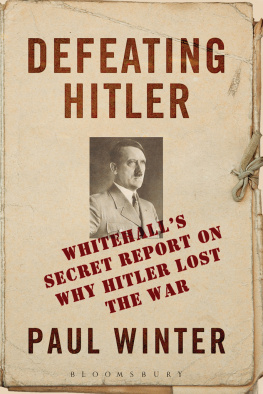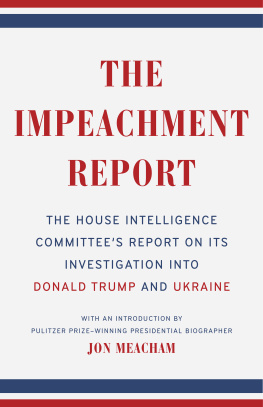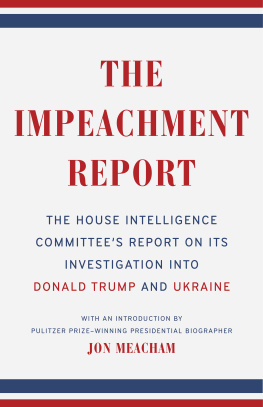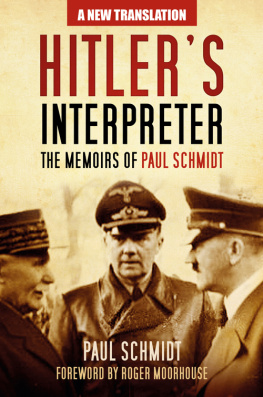Dramatis Personae
Werner von Blomberg (18781946)
Generalfeldmarschall von Blomberg. Appointed Minister of Defence in 1933 and Minister of War and Commander-in-Chief of the Armed Forces in 1935. In April 1936 he became Hitlers first Field Marshal. Forced to resign in 1938 due to a personal scandal involving his second wife, von Blomberg played no major role in the Second World War but was captured by the Allies in 1945. He subsequently gave evidence against leading Nazis at the Nuremberg War Crime Trials. He died in March 1946 while in Allied custody.
Martin Bormann (190045)
Appointed Reich Leader of the Nazi Party in 1933. Private Secretary to Rudolf Hess from 1933 to 1941. Promoted to Head of the Party Chancellery following the mysterious flight to Scotland by Hess in May 1941. Appointed Reichsminister in charge of the Party Secretariat and Staff 1942. Chosen by Hitler to be his Private Secretary in April 1943. Selected as commander of the Volkssturm (Peoples Army) October 1944. One of the last to escape the Fhrer bunker in May 1945, Bormanns whereabouts and ultimate fate remained a mystery obliging the International Criminal Court at Nuremberg to condemn him to death in absentia in October 1946. It was not until 1972, however, that his remains were discovered by workmen in Berlin.
Walther von Brauchitsch (18811948)
Generalfeldmarschall von Brauchitsch. Commander-in-Chief Army (Oberbefehlshaber des Heers) from 4 February 1938 until 19 December 1941 when he was forced to resign by Hitler following the failure of Army Group Centre to capture Moscow. Charged with war crimes after the war, Brauchitsch died in British captivity on 18 October 1948 before he could be tried.
Wilhelm Canaris (18871945)
Admiral Canaris, Chief of the Abwehr from 1935 to 1944. Naval officer, anti-Nazi conspirator and sub-source of intelligence for the British Secret Service. Arrested in July 1944, Canaris was eventually hanged at Flossenburg concentration camp on 9 April 1945 for his indirect involvement with the July Bomb Plot conspiracy against Hitler.
Karl Doenitz (18911980)
Grand Admiral Doenitz. Commander of U-Boats, 1 January 1936 to 1 May 1945. Commander-in-Chief Kriegsmarine, 30 January 1943 to 1 May 1945. Commander-in-Chief Operations (North) 17 April 1945 to 23 May 1945. Appointed Hitlers successor and became Reichsprsident and Commander-in-Chief of Armed Forces, 1 May 1945 to 23 May 1945. Sentenced at Nuremberg to ten years imprisonment in 1947. Released from prison in October 1956.
Joseph Goebbels (18971945)
Journalist and Doctor of Philosophy in Literature. One of Hitlers closest associates and a leading anti-Semite. Became a member of the Nazi Party in 1924. Made Gauleiter of Berlin in October 1926. Reich Minister of Propaganda from 1933 to 1945, and from July 1944 onwards General Plenipotentiary for Total War. Committed suicide with his wife and family in Berlin on 1 May 1945.
Hermann Goering (18931946)
First World War fighter ace. Reichsminister for Air. Commander-in-Chief of the Luftwaffe from 1933 to 1945. Appointed Plenipotentiary for the implementation of the Four Year Plan for Re-armament in 1936. Reichsmarschall and deputy/successor to Hitler. Captured by the Americans in May 1945, Goering was sentenced to death at the Nuremberg War Crime Trials in October 1946 but committed suicide before the sentence was carried out.
Heinz Guderian (18881954)
Generaloberst Guderian. Pioneer of armoured warfare and leading proponent of the Panzer and Blitzkrieg. Commander of XIX Panzer Corps during the Polish and French campaigns of September 1939 to June 1940. Commander 2nd Panzer Army from 5 October 1941 to 25 December 1941. Dismissed by Hitler in December 1941 for criticizing German strategy. Rehabilitated in February 1943 and appointed Inspector-General of Armoured Troops. Chief of Army General Staff from 21 July 1944 to 28 March 1945. Dismissed again by Hitler for insubordination. Captured by US troops in May 1945 but not charged with war crimes. Released from custody as a prisoner of war in June 1948.
Franz Halder (18841972)
Generaloberst Halder. Chief of the Army General Staff from 1 November 1938 until 24 September 1942 when he was dismissed by Hitler and replaced by Generaloberst Kurt Zeitzler. Implicated in the July Bomb Plot of 1944, Halder was arrested by the Gestapo and placed in Flossenburg and Dachau concentration camps. He was later transferred to Tyrol where he was liberated by US forces on 5 May 1945. He spent the next two years as a prisoner of war and gave evidence against leading Nazis at the Nuremberg War Crimes Trials. He later became an advisor to the US Army Historical Division and to the new West German Army.
Rudolf Hess (18941987)
Deputy Fhrer of the Nazi Party. First World War fighter pilot. Joined the Nazi Party in 1921 as one of its earliest members. Imprisoned with Hitler in Landsberg Prison following the failed Beer Hall Putsch of November 1923, Hess became the Nazi leaders private secretary transcribing and editing Mein Kampf. Appointed deputy Fhrer on Hitlers accession to power in 1933 thereby becoming one of the most powerful figures in the Third Reich. Disillusioned with Germanys war with Britain, Hess flew to Scotland on 10 May 1941 in order to broker a peace deal. Disowned by Hitler, he spent the rest of the war in British captivity and was tried at Nuremberg in 1946 for war crimes. Sentenced to life imprisonment, Hess spent the next 41 years in Spandau Prison in Berlin where he committed suicide on 17 August 1987.
Reinhard Heydrich (190442)
SS-Obergruppenfhrer und General der Polizei Heydrich. Nicknamed the Hangman and the Butcher of Prague. Chief of the Reich Main Security Office (RSHA) from September 1939 to 4 June 1942. President of Interpol from 24 August 1940 to 4 June 1942. Chairman of the Wannsee Conference on the Final Solution to the Jewish problem 20 January 1942. Deputy Protector of Bohemia and Moravia from 29 September 1941 to 4 June 1942. Mortally wounded in Prague by Special Operations Executive (SOE) trained Czech patriots on 27 May 1942. Died of wounds on 4 June 1942 in the Czech capital.





















